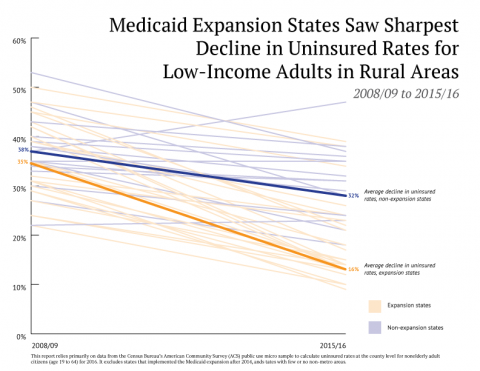
Fact of the Week: Drop in uninsured rates for low-income rural residents is three times larger in Medicaid expansion states
The uninsured rate for low-income adults has decreased in the last several years across America, thanks in large part to the Affordable Care Act. But small towns and rural areas of states that have expanded Medicaid have seen the sharpest decline in uninsured rates. That’s one of the findings of a new report from the Georgetown University Center for Children and Families and the University of North Carolina Rural Health Research Program.
The report found that the uninsured rate for low-income citizen adults living in small towns and rural areas dropped 19 percentage points – from 35 percent in 2008-2009 to 16 percent in 2015-2016 – in states that expanded Medicaid coverage. That’s more than three times the 6 percentage point drop seen in states that did not expand Medicaid, where uninsured rates fell from 38 percent to 32 percent over the same time period. These figures highlight the importance of Medicaid expansion in rural areas: not only did states that expanded Medicaid see their uninsured rate for rural populations cut in half, but the uninsured rate for these folks in non-expansion states remains double that of the same population in expansion states. Similarly, datareleased by the U.S. Census Bureau earlier this month showed that overall uninsured rates in non-expansion states was nearly double that of expansion states.
The report notes that states that experienced the biggest drop in uninsured rates for low-income adults living in small towns and rural areas are Arkansas, Colorado, Connecticut, Hawaii, Kentucky, Michigan, Nevada, New Mexico, Oregon and West Virginia. On the flip side, non-expansion states with the highest rate of uninsured low-income adults in rural areas are South Dakota, Georgia, Oklahoma, Florida, Texas, Alabama, Missouri, and Mississippi. See how your state compared here.
The report also looked at disparities between rural areas and metro areas. The findings: there is little to no difference in the uninsured rate for low-income adults in many Medicaid expansion states, while several non-expansion states saw rural uninsured rates 10 or more percentage points higher than those in metro areas.
The Washington Post compared the report’s findings to county-by-county voting data in states that didn’t expand Medicaid, and “found that rural counties that lack health-care coverage overwhelmingly voted for Trump in 2016.” As we know, the Trump Administration has been pushing to gut the Affordable Care Act, and in their latest act of doing so, is encouraging states to add harsh time limits to Medicaid in the form of strict work and reporting requirements. These new findings show that the Trump efforts will hit rural counties with his own supporters hard.
As our friends at the Center on Budget and Policy Priorities point out, rural areas face higher unemployment, lower labor force participation rates, and higher levels of part-time work, often with variable hours; this makes it more likely that large numbers of people in rural areas will lose coverage if a work requirement is in place. Online reporting requirements will also pose a problem, especially in rural areas where internet access can be spotty. Low-income rural residents already face less access to medical and social services. Our state and national elected officials should be expanding health care access to Americans living in rural areas, not making it harder for our rural neighbors to get the health care they need.
This post was originally published on the Coalition on Human Needs' blog, Voices for Human Needs. Receive similar articles in your inbox by subscribing today, and follow CHN on Facebook and Twitter.



The views and opinions expressed in this post are those of the author(s) and do not necessarily reflect those of MomsRising.org.
MomsRising.org strongly encourages our readers to post comments in response to blog posts. We value diversity of opinions and perspectives. Our goals for this space are to be educational, thought-provoking, and respectful. So we actively moderate comments and we reserve the right to edit or remove comments that undermine these goals. Thanks!